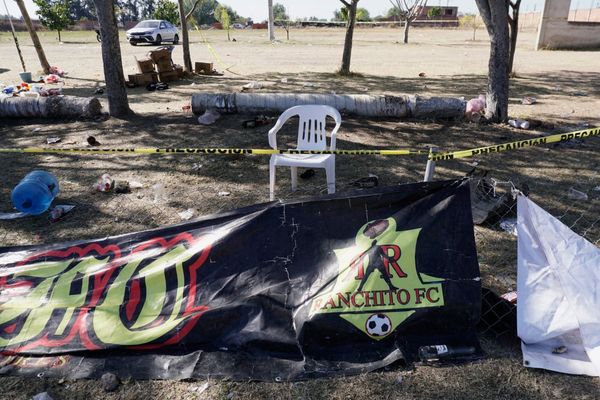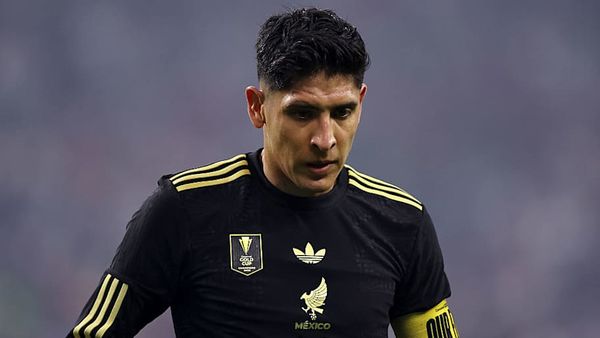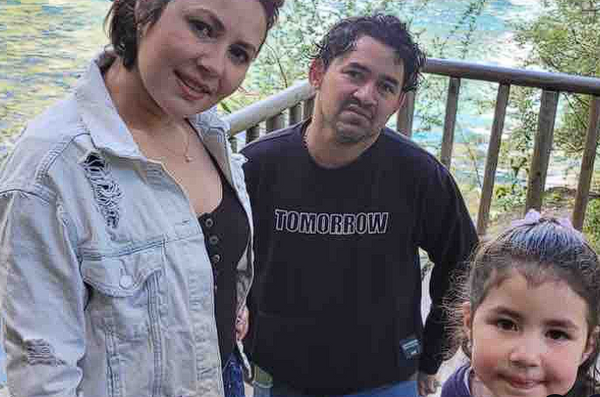
Marc Conway was regarded as a model IPP prisoner. Perhaps the model IPP prisoner. He received an indeterminate imprisonment for public protection (IPP) sentence at 30 for armed robbery. Before that, he had committed a long list of crimes including driving without a licence, selling class A drugs and firearm offences. He had spent eight years in jail. Now, here he was, a free man, studying with students from the University of Cambridge, working for the Prison Reform Trust and delivering speeches to the great and the good.
The date was 29 November 2019. The occasion was the fifth-anniversary celebration of an educational project in which Cambridge students and prisoners learned together. Conway, who had taken part in the project, had been asked to give a speech at Fishmongers’ Hall, a Grade II* listed building in the City of London. “It was a lovely sunny day. You never get that weather in November in London,” he says. “We had food, we was laughing, we was joking, we was patting each other on the back. I was getting a bit nervous, because I’d only been out a year and I was still new to public speaking.”
He went outside for a cigarette with a few others, including Saskia Jones, a Cambridge graduate who was also working on the project. She went back in before him. At the entrance, Conway could hear a commotion. He tried to open the door, but it was now locked. Conway looked through a glass panel in the door and saw someone being hit with a chair. “The man who got hit didn’t fall. He had two big knives in his hand. I was like: ‘Fuck, this is serious.’ I could see Saskia lying down on the floor, so he’d obviously attacked her. I was really scared. And I never get scared in them situations – I grew up being in pubs with people being shot, stabbed. I remember saying: ‘Someone’s got to ring the police.’”
The next thing Conway knew, the door opened and the man with the knives was being chased by a group of delegates, including Steven Gallant and John Crilly, who were out on licence and serving sentences for murder and manslaughter respectively. Crilly chased him with a fire extinguisher. Gallant, who was spending his first day out of prison in 14 years, chased him unarmed.
Conway followed them on to London Bridge. By the time he caught up with them, the delegates had wrestled the man to the ground. They tried to disarm the terrorist, who appeared to be wearing a suicide belt. Conway joined in. Then the police took over and shot 28-year-old Usman Khan 12 times. He died on the bridge. Khan, a delegate at the conference, had joined the programme, called Learning Together, while in jail. After the attack, Learning Together was disbanded.
Although the suicide belt proved to be a fake, Conway didn’t know that at the time. “As far as I was concerned, if he pulls that thing, I’m dead. So you’re fighting for your life. You’re thinking it’s just going to go off.”
Conway and his colleagues were heroes. They had risked their lives to stop Khan. But Conway didn’t feel in the least bit heroic. His first thought was not that he had protected the public, but that he might be returned to prison for having done so. Conway was, and remains, on licence. For IPP prisoners, this means they can be recalled to prison for even the slightest misdemeanour – simply being late for an appointment with a probation officer would do it. Conway had stamped on Khan. It didn’t matter that the police had no compunction about killing him; he was worried he had gone too far. The attack had been filmed by members of the public and was already on social media.
The first thing Conway did was ring his probation officer. It was about half an hour after the attack and he was being transported to a crisis centre. He was still in shock. “I rang her for two reasons. One, I wanted to let her know that I had done nothing wrong before the wheels of recall got put into place. And two, I did not want my victims to look on the news and see my face, or read a paper and see my face, because I was one of the first people identified.”
What did he say to his probation officer? “I was like: ‘I was there – we smashed the geezer up and disarmed him. I’m just letting you know now, because obviously it’s going to be on the TV.’ I rang her before my girlfriend and my mum. I said: ‘I just wanted to let you know what I did and why.’” What did she say? “She was like: ‘What is wrong with you?! Ring them; let them know you are safe. Why are you ringing me?’”
The answer was: because he was an IPP prisoner on licence. The sentence was introduced by the Labour home secretary David Blunkett in 2003 and first used in 2005. It was conceived to protect the public from serious offenders whose crimes did not merit a mandatory life sentence, but it ended up being used much more widely and often for relatively minor offences. Blunkett recently told the Guardian that devising the sentence was his “biggest regret” in government.
Indeterminate sentencing was so controversial that it was abolished in 2012 after being ruled an abuse of human rights. However, while the sentence was abolished, those still serving one were not resentenced. Thousands of them are still in prison, with no idea when they will be released.
While IPP prisoners are automatically referred to the Parole Board to have their licence considered for termination after 10 years of being released (with a bill being debated in the House of Lords to reduce this to three), they can remain on licence for 99 years. More than half of the 2,796 people on IPP sentences have been recalled, many over minor infringements. Martin Myers, whose story we told this month, has spent 18 years in jail for trying to steal a cigarette; he was recalled for taking Valium that had not been prescribed. So Conway had good reason to be worried.
***
Conway, 43, is a warm, garrulous man with a gruff cockney accent. You could imagine him in a Guy Ritchie movie as the likable gangster you wouldn’t want to cross. Which is what he was in his previous life. He grew up in Plumstead, south London, the oldest son of a single-parent family: his mother is white and English; his father, whom he never knew, is Iranian. His mother, who had him at 16, told Conway from an early age that he was the man of the house – and he took his responsibilities seriously. He was more of a father than a brother to his sisters, who were of Jamaican heritage and much younger than him. Conway was bright and, early on, a studious pupil. “The type of kid who did his homework on the bus,” he says.
In the early 90s, the far-right British National party was active locally. They would stand outside shops and stalk Conway’s estate, handing out racist leaflets and stirring up trouble. One day, the family was in the town centre and a BNP skinhead spat at his mother and verbally abused her. “A police officer came round the corner. I thought we were safe and my mum told him what had happened. He said: ‘This is what you get for having kids with a coon,’ and sent us on our way.”
The funny thing is, as a young kid, Conway had wanted to be a police officer. “I had the plastic hat and whistle and truncheon. Mum said after that [incident with the police officer], I went home and threw it in the bin. I never trusted police since.”
By 12, he was stealing hubcaps. “The local scrap geezer used to give us £5 for a set. And that’s a lot of money when you’re a kid.” At 15, he was sent to Feltham young offender institute. “From 15 to 21, I only had one Christmas out.” He was jailed seven times. He would like to say he hated crime, but he didn’t. “I just loved the life, the buzz, the togetherness of it.” He says he didn’t have a conscience back then; he wasn’t aware of the damage he was doing to innocent people. But there was another problem. He was a useless criminal. “I never had a genre of crime. I was a jack of all trades and shit at them all, so I got nicked for everything.”
At 25, he had twins with his girlfriend. For the first time, he says, he had a purpose. When they broke up, Conway brought the children up by himself. But then his ex won custody of the kids. Conway was devastated. He returned to crime. He tells me he is not making excuses. He had already served a lengthy sentence for armed robbery, so when he was convicted of another armed robbery in 2011, he knew he was going down for a long time.
He says he celebrated when he got an IPP with a five-year tariff; he was expecting 10 years. But back then, like most people handed the sentence, he didn’t fully understand what IPP meant – that he could be jailed for ever, or released on a never-ending licence.
This time, Conway turned his life around in prison. He was well behaved and lucky. Many IPP prisoners don’t have access to the courses they must take to address their crimes and prove they are no longer a danger to the public. Conway did. (Tommy Nicol, whose story we told in April, killed himself after being refused parole twice because he had been unable to get on the necessary courses.)
What really changed things for Conway was being sent to Grendon, a therapeutic community prison in Buckinghamshire where inmates are heavily involved in its running. “Obviously, you’ve got your basic prison rules. But if you want a job, for example, like a wing cleaner or working in the gym, you have to get backing from the rest of the lads – they have to vote yes or no. If it’s no, you don’t get that job. Same for family visits, kids’ visits, doing a degree through the Open University. You have to get permission from your community first. It’s very peer-led.”
While he thought the IPP sentence he had been given was unjust, he finally started to address his offending behaviour seriously. “I was looking at how much of a scumbag I’d been.” Had he hurt people? “Yeah, mentally, massively. Like sticking a gun in someone’s face and demanding money. If you live in that type of world, that’s still a big thing. If you don’t live in that type of world, that’s life-changing. I probably retired people without even knowing it.”
It was at Grendon that he began working with Cambridge academics through Learning Together. After eight years, three years beyond his tariff, he was released. Conway went straight into a job with the Prison Reform Trust, a charity that aims to improve conditions for prisoners and reduce unnecessary imprisonment. “My mate saw the job advertised and he was like: ‘That’s you. You’re always advising people on prison law.’ I was always arguing with the officers about what’s right and what’s wrong. I was very opinionated and gobby. I thought: no, mate, they won’t take someone like me.”
But they did. He had been supported by Jack Merritt, a Cambridge graduate on Learning Together, who had helped him apply for his job. The two men became friends. “When I went to Cambridge, we would always go for a beer or a meal. He was just this lovely guy.” Merritt and Jones were killed by Khan.
When he thinks of the attack now, it happens in slow motion. He has post-traumatic stress disorder, but he doesn’t think the attack is solely to blame. He believes the IPP sentence has contributed. He tells me what was going through his head on the journey to the crisis centre after the attack. “At the time [of the confrontation with Khan], people were going: ‘Don’t hurt him.’ So that was coming back to me and I was thinking: ‘Have I gone over the top there?’” All it would have taken was a word of concern from his probation officer to be recalled. “This is the pressure of being on licence. It’s like walking on eggshells. But it’s like the eggshells are scattered around a minefield.” Fortunately, his probation officer had worked with Conway for six years and they got on well. She told him there was no danger of a recall.
Conway looks so sure of himself. Inside, though, he is a bag of nerves. He is coming up to the fifth anniversary of his release. This is significant, because the conditions of his licence change. “After five years, you come off the supervision period: you can live where you want, go on holiday when you want, do what you want. Before that, you have to be able to be in constant contact with your probation officer.”
What makes the five-year mark even more significant is the legislation before parliament to reduce the period after which an IPP licence can be terminated from 10 years to three. If the victims and prisoners bill becomes law, people on IPP licences who were released five or more years ago will have their licences terminated automatically.
He is terrified that there will be an election before the legislation becomes law, which would mean going back to square one. And he is equally terrified that he could get into bother in the days before his supervision period is over. “So when I am in the pub and it kicks off, I walk out. When I am walking down the street and there is an argument, I cross the road. I second-guess every movement now. I think: ‘If my probation officer saw me in this situation, what would it look like?’”
He says his health has suffered. “My anxiety is through the roof. I had a medical when I got out of prison; it said I had lungs of someone 15 years younger than me and my body was also like someone 15 years younger than me. Now, I have seriously high blood pressure. I’m on the strongest medication you can get for that. And I’ve been on tablets for depression since I’ve been out, which I’d never been before. I’ve stopped taking them now. The licence condition has had a massive effect on my anxiety.”
What will it mean to him to have his licence terminated? “I think my blood pressure will instantly drop.”
***
The similarities between the lives of Andrew Morris and Marc Conway are uncanny. Like Conway, Morris was born to a 16-year-old mother and a father he never knew, brought up in south London and wanted to be a police officer. He also went off the rails, received an IPP sentence and then became a model citizen, campaigning against injustices in the prison system. And, like Conway, he is petrified of things going wrong as he comes to the end of his licence period.
Morris, 46, is a smartly dressed, quietly spoken man. He grew up with his grandmother and grandfather, whom he knew as Mum and Dad, until he was 11. He then returned to his mother. There were now two women in his life he referred to as Mum. He was reasonably well behaved at school. His worst offence was getting 1,000 lines for swearing at a teacher, although it scored pretty low in the profanity charts. “She was called Mrs Naff. I told her to naff off. It’s not massive swearing, but it was gold at the time,” he says.
At school, he joined the police cadets. His friends weren’t happy with him. Why did a black lad want to join a racist institution, they asked. He told them he knew the Metropolitan police was racist and he wanted to change its culture. “My mates ripped the piss out of me,” he says. “On my school shirt when I left, they wrote ‘Good luck copper’ and ‘Good luck Pig’.”
One day, he found himself noseying around the collators’ room at the police station, where they kept confidential information. Morris was fascinated – he could see all kinds of stuff about people he knew. But he was caught and kicked out of the cadets. Around the same time, he got badly beaten up by half a dozen young people from the estate who had heard of his police aspirations. “I thought: this is a mad place to be, because on the one hand all my mates or ex-mates don’t want anything to do with me, and on the other hand neither do the Old Bill, because I crossed that line.”
After his grandmother died, he started drinking heavily. He was jailed for stealing a car. Then he was remanded for armed robbery, of which he was cleared. In prison, a fellow inmate offered him a joint laced with crack cocaine. He was instantly hooked. As soon as he was released, he went looking for crack. He stole from his mother and they fell out. Morris ended up homeless, living for a while on the streets of south London.
He was now in his mid-20s and desperate to rebuild his life. He left London for Cheltenham, got a job, kicked his drug habit and met a girl he adored. Before long, she was pregnant. They moved in together. Shortly before the baby was born, they had a falling out. He pushed her and she reported it to the police. He was arrested on suspicion of assault. One of his bail conditions was that he kept away from the house.
When their daughter was born, Morris wanted to see her and to try to make amends. He asked the police if he could go round to collect his possessions. He admits it was an excuse. The police said yes. When he got to the home, they were there to greet him – as were his ex-girlfriend’s mother and brother. “My girlfriend and I went into the garden and had a cigarette and I said: ‘It’s silly – why do we need the police here?’ and she said: ‘Just take your stuff and go.’”
He left, but he was upset and angry. Ten minutes later, he did something he will regret all his life: he climbed over a wall and entered the house through the back door. He says he could hear his girlfriend and her brother laughing. The red mist descended. He went into the kitchen and picked up a vegetable knife. “I walked up the stairs and she said: ‘What the fuck are you doing in here?’ I pulled out the knife and said: ‘Shut up and sit down.’ I was controlling. I wanted to see our daughter and yet I’m committing an offence in her presence.”
He starts to talk in the present tense, as if it’s happening now, and becomes tearful. He still can’t explain what came over him; all he knows is that he did something unforgivable, caused his then girlfriend unimaginable trauma – and did so in front of their child.
Things escalated quickly. Her brother took the baby downstairs, leaving Morris and his girlfriend in the bedroom. She pressed a panic alarm she had been given by the police. Within minutes, armed officers were inside the house and television cameras were outside. His girlfriend had locked herself in their en suite bathroom. When Morris knew the police had arrived, he locked the bedroom door. As soon as he did that, he was facing a conviction for false imprisonment.
He knows it could have been so much worse. “The police were talking to me through the door. I thought I was going to get shot.” After 90 minutes, he was talked out of the bedroom, given a cup of tea and a cigarette, handcuffed and taken away. At the police station, he phoned his uncle. “He said: ‘You don’t need to tell me what’s going on, because I’ve just seen it on the news.’”
Morris was devastated by what he had done. He pleaded guilty to false imprisonment and threats to kill, even though he doesn’t remember making them. “I remember making some kind of threat. I wouldn’t have threatened to kill her, because I wouldn’t want to hurt anybody. That’s the truth. I did threaten to kill myself, though.”
Morris received an IPP, but the tariff was only one year and 254 days. That wasn’t what registered, though. “In court, I didn’t hear anything except ‘life’. The judge mentioned the words ‘discretionary life’. Then I got a copy of the transcript and when I read it I realised I was fucked.”
He tried to kill himself on the first night of remand. “Afterwards, I thought: if I fucked that up, there’s no way I was meant to die. I never tried again. I thought: the only way I’m leaving prison is through the gate.” He dedicated himself to reading and learning. In prison, he completed the first two years of a law degree through the Open University. He is now in his fourth year.
Despite being a model prisoner, Morris served more than four years longer than his tariff. On his release, he did labouring work, continued studying and had a fling with an ex-girlfriend. He had been out only a few weeks when he got a call from her, in tears, saying her mother had been taken to hospital and asking him to visit with her. “I raced over there by train. Then, as I get there, there’s some guy there. I said to her: ‘You just rang me, crying your eyes out, and there’s another guy here. What’s wrong with you?’” Morris says the other man took offence and they ended up fighting.
As Morris was on licence, he knew any complaint about him could end with a recall to prison. So he called the police to explain what had happened. When the police arrived, things were peaceful. The officers seemed satisfied with Morris’s version of events. He went home, thinking that was that. “Two weeks later, these coppers turn up. They park their car across the drive like TJ Hooker and they’re banging on the door. They said: ‘Mr Morris, you’re being recalled to prison.’ I thought I’d be out within a month.” He would serve another six and a half years.
In Spring Hill open prison, he spent much of his time supporting other prisoners. “I inducted over 300 people – showed them around, did their paperwork, allocated them a bed space, gave them a key to their room. Everything they needed to know.” After two years, he had a parole hearing, which was denied. He still doesn’t know why.
His mental health suffered, but, like so many IPP prisoners, he was scared to tell staff. “There were times when I thought: I don’t want to be here any more. But I never told anybody, because if I shared it I’d be treated even more as a danger. Imagine going to tell a prison psychologist you feel suicidal. They’re definitely going to recommend you for release, aren’t they?!”
In September 2023, the prisons and probation ombudsman (PPO), Adrian Usher, wrote: “A prisoner’s IPP status should be considered as a potential risk factor for suicide and self-harm.” That is the shocking catch-22 of IPP – it is a sentence that damages mental health, then poor mental health becomes a reason for not releasing prisoners serving the sentence.
Shortly before he was approved for release, in 2019, Morris heard about job opportunities at the PPO, which is funded by but independent of the Ministry of Justice. He was told lifers couldn’t apply. The prison governor told him he should apply anyway.
“I went off on home leave, and when I came back the governor came up to me and shook my hand and said: ‘I’m so proud of you.’ I said: ‘What are you talking about?’ and he said: ‘They’ve offered you the job.’ I said: ‘Fuck off.’ He said: ‘Behave yourself!’ I said: ‘No disrespect, governor, what are you talking about?’”
Morris spent three years assessing complaints from prisons for the PPO. Today, he works in an office job and is a trustee of the prison reform charities the Howard League for Penal Reform and the Raphael Rowe Foundation.
Like Conway, Morris has been out for almost five years. And, like Conway, the closer he gets to having his licence terminated, the more anxious he becomes. “When I was working at the PPO, as the ex-offender in the office, I was terrified that somebody would make an accusation and I’d end up back in prison.” He always uses an app on his phone that shows where he is at any point. Just in case.
However pleased Morris is with the bill to make it easier to release people serving an IPP sentence who have been recalled, he says it’s not enough to eradicate what the former supreme court justice Lord Brown has called “the greatest single stain on our criminal justice system”. Ultimately, almost 3,000 people are still serving a sentence that was abolished 12 years ago because it violated the European Convention on Human Rights. As Morris knows only too well, the rules of recall are so draconian that, for some, simply the fear or prospect of recall has been enough to destroy their lives. Any change in legislation will come too late for the 90 people who have killed themselves while serving an IPP.
***
In 2010, 35-year-old Matthew Price was handed an IPP with a three-year tariff for seriously wounding his friend. Price was one of the lucky ones – or so it seemed. He was released on parole in 2013, rather than being kept inside indefinitely, although he was subject to the harsh IPP licence conditions. Still, like Conway and Morris, he appeared to be a rare IPP success story. He was living and working in the community and hadn’t committed further offences.
Yet on 22 May 2023, he wrote a despairing email to a number of people, including the justice secretary, Alex Chalk. He had been out almost 10 years and was within touching distance of a licence termination, but still he lived in fear of going back to prison. “I need mental health support and I feel I need to be back on medication to be able to cope with this sentence, but I’m too scared to ask for it, because doing so will go against my chances of ever bringing my sentence to an end,” he wrote.
“I’m stuck in a never-ending cycle of which suicide is quite possibly really the only way out. Asking for help will go against me, not asking for help will most likely kill me … Of course I needed to go to prison as a result of my actions but how can it be right that I’m being expected to cope on a irredeemably flawed sentence, that’s inhumane and was abolished in 2012, and also be on a potentially lifelong licence that might never end,” he continued.
“The fact is, the never-ending and never-knowing nature of this sentence feeds poor mental health. Even those on whole-life orders or on any other sentence at least have a sentence that brings clarity for both victims and offenders.
“This is a cry for help because this never-ending sentence and the not knowing has crushed and broken me and I don’t know what to do for the best anymore.”
Three weeks later, on 16 June, Price killed himself.
• In the UK and Ireland, Samaritans can be contacted on freephone 116 123, or email jo@samaritans.org or jo@samaritans.ie. In the US, you can call or text the National Suicide Prevention Lifeline on 988, chat on 988lifeline.org, or text HOME to 741741 to connect with a crisis counselor. In Australia, the crisis support service Lifeline is 13 11 14. Other international helplines can be found at befrienders.org
• Do you have an opinion on the issues raised in this article? If you would like to submit a response of up to 300 words by email to be considered for publication in our letters section, please click here







